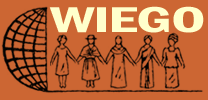Women in Informal Employment: Globalizing and Organizing (WIEGO)

Women in Informal Employment: Globalizing and Organizing (WIEGO) is a global research-policy network that seeks to improve the status of the working poor, especially women, in the informal economy. It does so by highlighting the size, composition, characteristics, and contribution of the informal economy through improved statistics and research; by helping to strengthen member-based organizations informal workers; and by promoting policy dialogues and processes that include representatives of informal worker organizations. The common motivation for those who join the network is the relative lack of recognition, understanding, and support for the working poor in the informal economy, especially women, by policy makers, economic planners, and the international development community.
Membership
The Members and Associates of the WIEGO network, including the members of its Steering Committee and Advisory Committees, are drawn from its three constituencies:
- member-based organizations of informal workers;
- research, statistical, and academic institutions; and
- international development agencies (non-governmental and inter-governmental).
Programme Areas
Most activities of WIEGO fall under one of its five major Programmes:
- global markets
- organization and representation
- social protection
- statistics
- urban policies
The component activities under these Programmes involve some mix of research studies, data analysis, case study documentation, and policy dialogues. WIEGO’s Organization and Representation Programme also seeks to strengthen – and build networks of – member-based organizations of informal workers; and its Statistics Programme seeks to promote improved statistics and statistical analysis of the informal economy.
Select Publications
- Adato, Michelle, Akhter Ahmed and Francie Lund. 2004. Linking Safety Nets, Social Protection and Poverty Reduction: Directions for Africa. IFPRI 2020 Policy Brief for All-Africa Conference.
- Alia, Patrick O., Winnie Mitullah and Anne Kamau. 2002. Policies, Regulations, and Organisational Capacity of Women Street Vendors in Kenya: A Handbook. Nairobi: Institute of Development Studies, University of Nairobi.
- Bajaj, Majul. 2000. “Invisible Workers, Visible Contributions: A Study of Homebased Women Workers in Five Sectors across South Asia.” Background Paper for South Asia Regional Policy Workshop on Home-Based Work, September 2000.
Legal Briefs series
WIEGO announces the addition of Legal Briefs to the WIEGO Publication Series. Developed in part to meet requests from organizations of informal workers and their advocates, these briefs describe the legal environment facing informal workers, and analyze legal strategies and precedent-setting cases that may lead to more secure livelihoods.
- Legal and Policy Tools to Meet Informal Workers’ Demands:Lessons from India (March 2013)
- A Experiência de Advocacy no caso dos Trabalhadores Ambulantes em São Paulo (March 2013 – Portuguese)
- Using the Right to Information in the Informal Economy: A How-To Guide (October 2012)
References
Other relevant information
New Study: “No Cushion to Fall Back on: The Global Economic Crisis and Informal Workers” available at: http://www.wiego.org/about_ie/ie_news/EconomicCrises2009.php
See also
- Women and the Informal Economy


